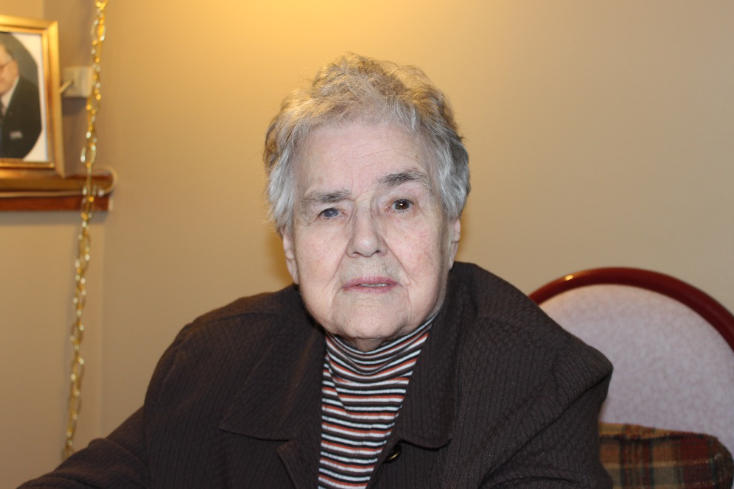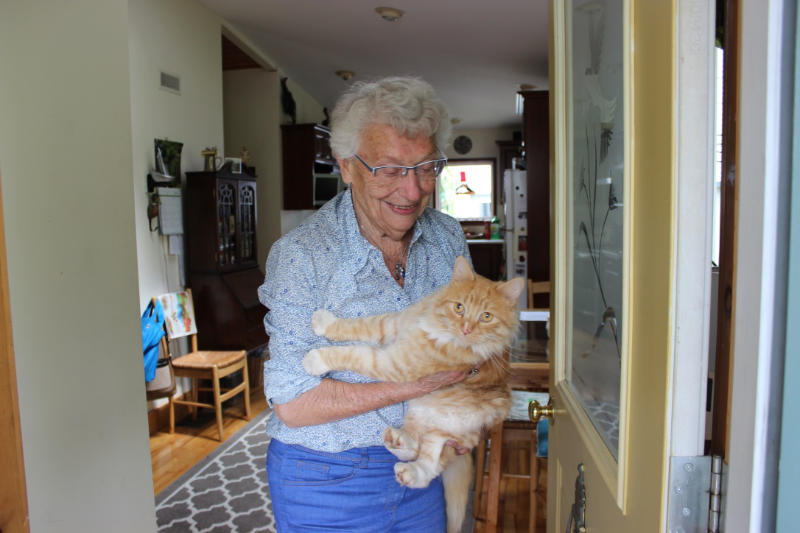Life Stories of
90+ Elders
Project Summary
Many believe that soon, we will face serious issues regarding health and care of an ageing population (Brink, 2004). In the Canadian population, baby-boomers represent the largest cohort (Statistics Canada, 2007a) and life expectancy has increased. Interestingly, it is usually never mentioned that seniors are expected to be healthier and retirement age has already increased. Moreover, many of the individuals who reach an exceptional old age (90+) are in relatively good health and live mostly autonomously (Andersen-Ranberg et al, 2001; Hitt et al., 1999; Perls, 1995; Walter-Ginzburg et al., 2005). As such, they demonstrate resilience and strength. We also know that keeping elders in their own homes for as long as possible is the most cost-effective strategy, when compared to institutionalised arrangements (Chappel et al., 2004), and the most humane.
This study aims to extend our understanding of elder elders’ resilience during the aging phase of life. Using qualitative life history techniques, the stories of elder elders will be obtained and studied to gain insights into the successes and challenges of the aging process. Specifically, this project seeks to answers questions such as: What strategies have elder elders used and currently use to succeed in their lives? What is the role of gender in the “storying” of life among the 90+ year olds? What social institutional practices, policies, and ideologies hinder/facilitate elder elders’ life worlds? What are the cultural determinants of living through the latter years with resilience? Is longevity intertwined with specific meaning-making of life experiences?
Findings have the potential to inform: 1) policy decisions regarding the commitment of community resources, adoption of services, and development of interventions to enhance the environment, wellbeing, resilience, and independence for our aging society; and 2) the development of a resilience model for marginalised groups in general and elders in particular.
Project Findings
Project Description
Andersen-Ranberg et al., (2001) suggest that the global population will face major life challenges in the near future. Examining the life history narratives of elder elders, therefore, has the potential to provide empirical insights into the circumstances, coping strategies, perspectives, and social strategies that will benefit future generations. Given the current political rhetoric of budgetary cuts and deficit reduction, this knowledge is critical for policy decisions regarding the commitment of resources, adoption of services, and development of interventions.
For this research, we will use P-SEC Methodology (Gouliquer & Poulin, 2005). This methodology is a multidisciplinary approach that facilitates the study of marginalised individuals whose lives are affected and shaped by social institutions and their social relations of power (e.g., home care services, families). By focussing on both the sociological context and the individual psychologies, it helps us understand the gendered, ageist, racial, heterosexist nature of social relations, their intersections, and the organisation of peoples’ worlds. P-SEC’s greatest strength is in explaining complex social relations that organise the life realities of a marginalised group, while keeping their human experience central to the research.
References
Andersen-Ranberg, K., Schroll, M., Jeune, B. (2001). Healthy centenarians do not exist, but autonomous centenarians do: A population-based study of morbidity among Danish centenarians. Journal of the American Geriatrics Society, 49(7), 900-908. doi: 10.1046/j.1532-5415.2001.49180.x
Brink, S. (2004). Elder care: the nexus for family, work and health policy. Ottawa, ON.: Caledon Institute of Social Policy. Retrieved from: https://www.lib.unb.ca/.
Chappell, N. J., Dlitt, B.H., Havens, B., Hollander, M. J. Miller, J., & McWilliam, C. (2004). Comparative Costs of Home Care and Residential Care. The Gerontologist 44(3), 389-400. doi: 10.1093/geront/44.3.389
Gouliquer, L., & Poulin, C. (2005). For Better and for Worse: Psychological Demands and Structural Impacts of the Military on Gay Servicewomen and their Partners in Long- term Relationships. In D. Pawluch, B. Shaffir, & C. Miall (Eds), Doing Ethnography: Researching Everyday Life.
Hitt, R., Young-Xu, Y., Silver, M., & Perls, T. (1999). Centenarians: the older you get, the healthier you have been. The Lancet, 354(9179), 652.
Perls, T. T. (1995). The oldest old. Scientific American, 272(1), 70-75.
Statistics Canada (2007a). Portrait of the Canadian population in 2006, by age and sex, 2006 Census (Catalogue no. 97-551-XIE). Ottawa, Canada: Ministry of Industry.
Walter-Ginzburg, A., Shmotkin, D., Blumstein, T., & Shorek, A. (2005). A gender-based dynamic multidimensional longitudinal analysis of resilience and mortality in the old-old in Israel: The cross-sectional and longitudinal aging study (CALAS). Social Science & Medicine (1982). 60. 1705-15. DOI: 10.1016/j.socscimed.2004.08.023.
Publications
Gouliquer, L., Poulin, C., & Lesmana, M. (2015). Mobility boundaries between home, community and beyond: Experiences of the exceptionally old living in a Canadian province. Qualitative Sociology Review, XI (3), 124 – 150. https://doi.org/10.18778/1733-8077.11.3.08
Presentations
Gouliquer, L., Poulin, C., & Lesmana, M. (2014). What Do Pets Have to Do with It? Older Adults, Neoliberalism, and the Replaceable/Disposable Family. Atlantic Centre for Qualitative Research & Analysis: Qualitative Luncheon (21 November).
Lesmana, M., Gouliquer, L., & Poulin, C. (2014). Experiences of the exceptionally old living in New Brunswick: Friends, ageism, and health. 6th Annual New Brunswick Health Research Conference. Delta Beausejour Moncton, NB (13 -14 November).
Gouliquer, L., Poulin, C., & Lesmana, M. (2014). What do pets have to do with it? Understanding the 90+ year-old in the neoliberal era. Aging & Society: Fourth Interdisciplinary Conference, Manchester, UK (7-8 November).
Gouliquer, L., & Poulin, C. (2014). Boundaries of aging: How you feel about it and how I feel about it! 30th Qualitative Analysis Conference, London, Ontario (25-27 June).
Lesmana, M., Gouliquer, L., & Poulin, C. (2014, June). Physical consequences of being old and their impact on independence and social life. 31th Qualitative Analysis Conference – Brescia University, London, ON (25-27 June).
Gouliquer, L., & Poulin, C. (2014). Boundaries of aging: How you feel about it and how I feel about it! 31th Qualitative Analysis Conference – Brescia University, London, ON (25-27 June).
Lesmana, M., Gouliquer, L., & Poulin, C. (2014). How does neoliberalism influence the 4th age? Experiences of people aged 90 and over. Poster-presentation at the 75th annual convention of the Canadian Psychological Association, Vancouver, Canada, June 5.
Purpose and Importance
of this Study
To document daily experiences and resiliency of elder elders from “their perspective.”
To examine how the social, cultural, and ideological influences and meanings about ageing affects elders, both positively and negatively.
To investigate cognitive and behavioural coping mechanisms that lead to resilience.
To evaluate the effectiveness of the policies created by the institutions regarding elders’ well-being from elder elders’ own perceptions.
To make comparisons between men and women elder elders, and between Anglophone and Francophone elder elders.
To make policy recommendations based on the findings.
Facts
In 2011, there were about 218,000 elders aged 90 years and over in Canada, or less than one percent of the Canadian population (Statistics Canada, 2013)
Support for this Study










